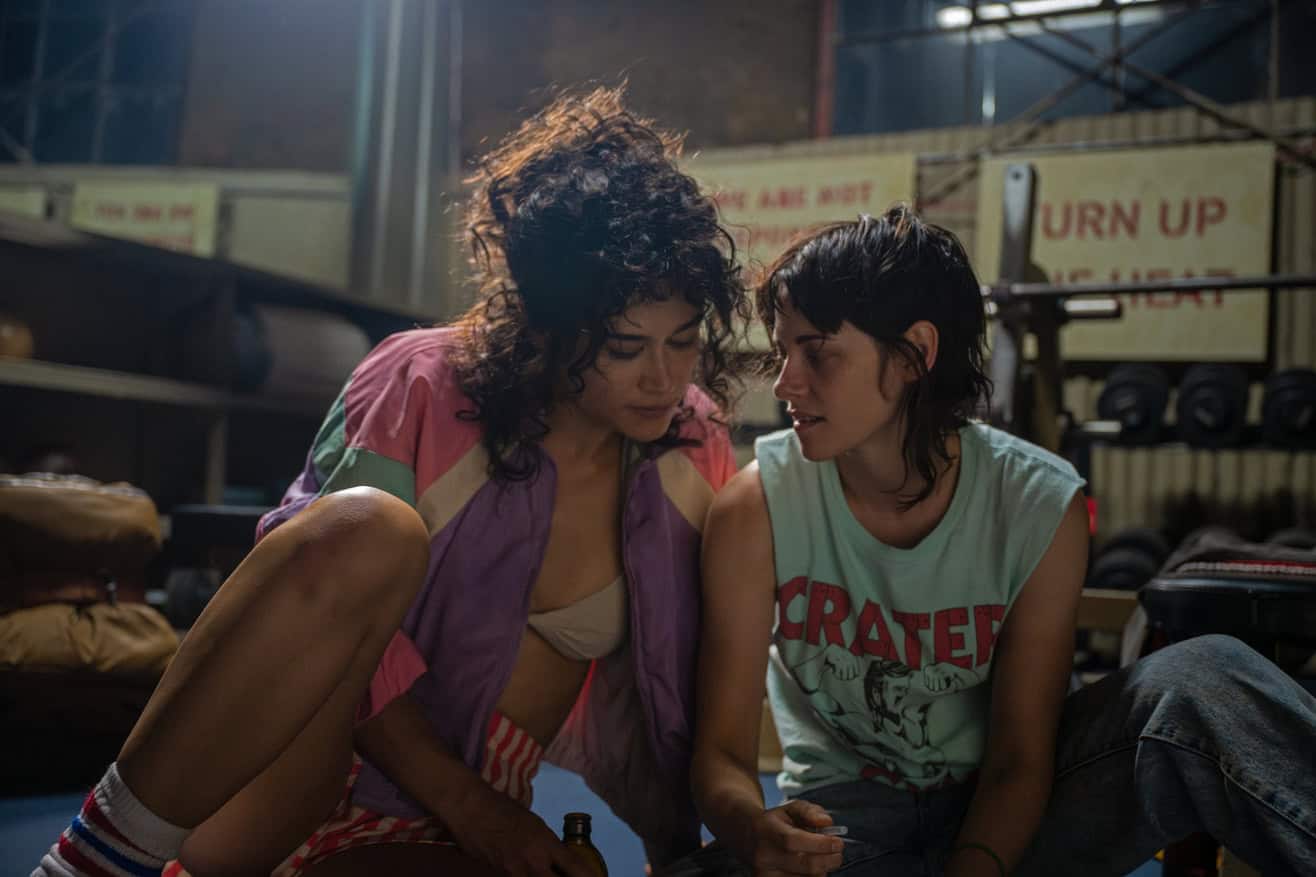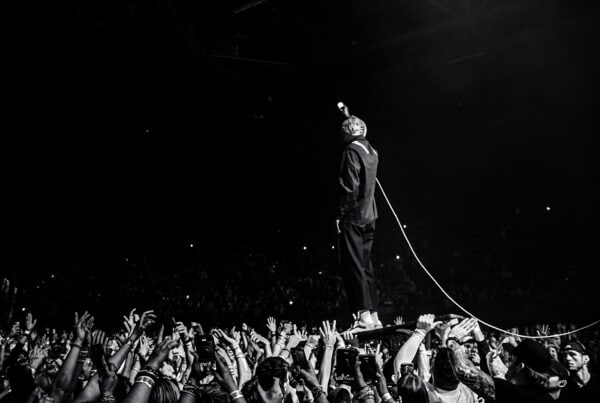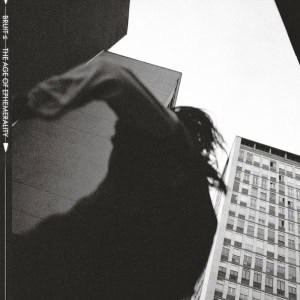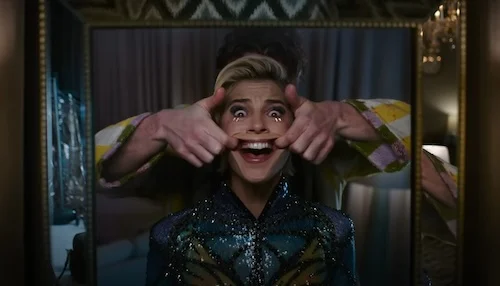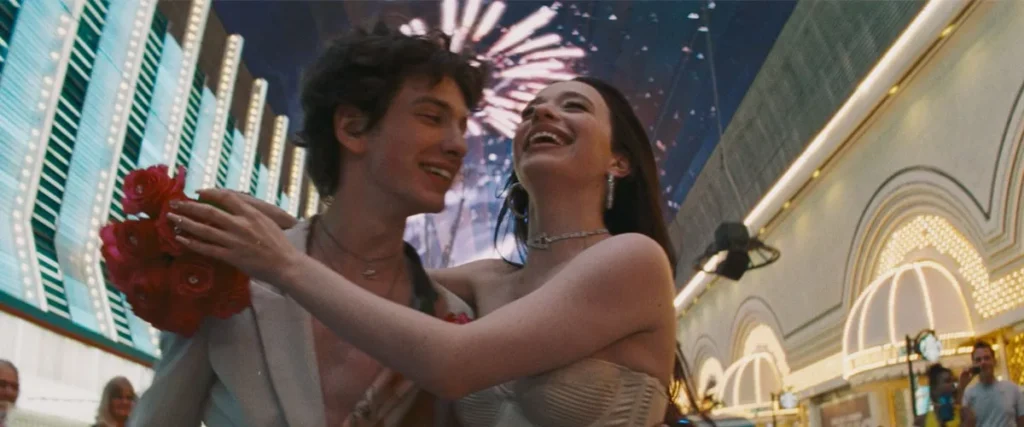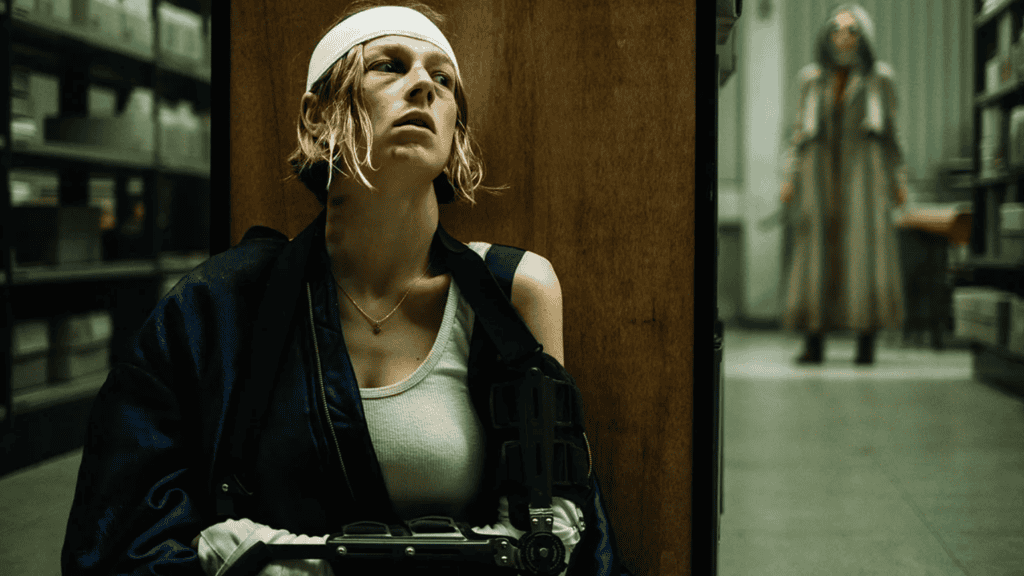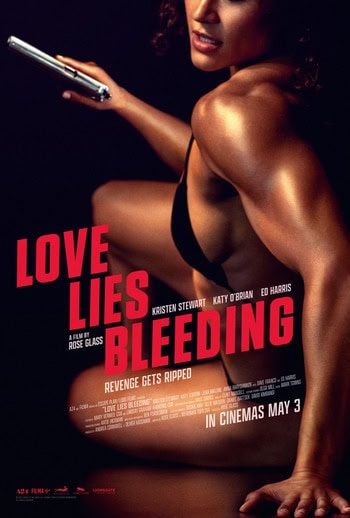 Words: Callie Petch
Words: Callie Petch
Around four-and-a-half years ago, needing a slot to fill during my time at the London Film Festival, I stumbled into a screening of writer-director Rose Glass’s debut feature, Saint Maud, and got my shit totally rocked. Not just because it was a horror-ass horror movie despite being billed as a “psychological drama” in the programme and I’m a perpetual anxiety machine who struggles through horror at the best of times. But also because it had been a long time since I’d seen a debut as commandingly directed as Saint Maud; the equivalent of a debut album where the artist comes out fully-formed already at the top of their game. Her handling of tension, invigorating reality-tweaking atmosphere, and compelling character psychology were more assured than directors with quadruple her experience. And, for as much as the aesthetics and pacing fronted the divisive A24 brand of self-serious horror-as-metaphor, Glass also demonstrated a fun streak, a willingness to lean into the inherent campiness of religious horror, which belied a desire to meet the crowd in the middle and not think of herself as above genre-fare.
I saw a hell of a lot of films during that LFF, a few of which we now consider modern classics – Knives Out, The Irishman, Portrait of a Lady on Fire – yet Saint Maud was the one I ended up most rhapsodising. The film I was most excited by, the one I refused to shut up about to all my friends, and the one I braved mid-pandemic cinemas for to see again upon general release in October 2020. If filmmaking careers worked like the stock exchange, I’d have sold all my possessions to invest in Rose Glass. Whatever she wanted to make next, I would be there opening night even before it came out that said next film would be a lesbian bodybuilding erotic crime thriller starring Kristen Stewart; a combination of words precision-tuned to get my queer arse frothing at the mouth.
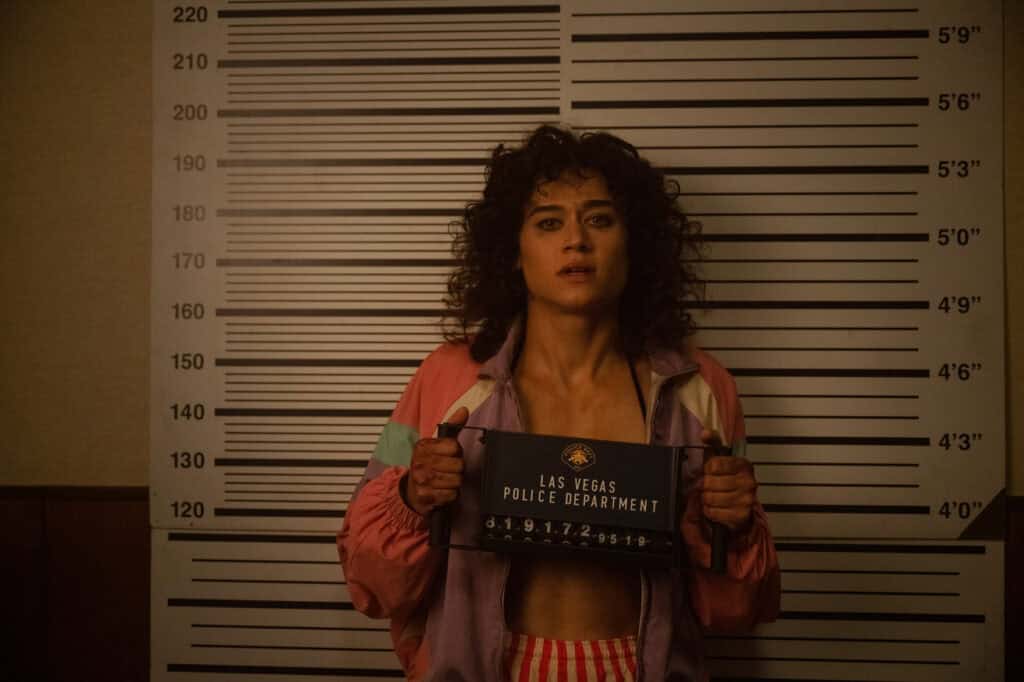
Credit: Anna Kooris.
And unlike that other big horny drama which has everyone down real bad on main right now, Glass hasn’t disappointed. Love Lies Bleeding is the kind of fearlessly singular thriller that simultaneously plays to the bleachers and is capable of making its most attuned cult audience – the horny little genre-loving queers – ready to bust out cartwheels in glee when the credits roll. At a time when genre cinema is so hammered on irony that it’s too busy rolling its eyes to have any real fun, and we’re so desperate for even the slightest dregs of heat on-screen that people are willing to hold up a director who (based on his filmography) has never had sex in his entire life as the saviour of intimate cinema, Rose Glass has the remedy. A cocktail of Cronenberg, Coen, Lynch, and Wachowski that nonetheless feels like a natural evolution of her voice from Saint Maud. But where Maud’s examinations of desire and the interplay of sex & control got filtered through and stamped down by Catholic guilt, Love Lies Bleeding is more passionate, open, and accordingly messy.
In a backwater town somewhere near Las Vegas in 1989, Lou (Stewart) is an antisocial gym owner stuck in a one-sided fling of an infatuation with what seems like the only other lesbian in the area, Daisy (Anna Baryshnikov). Frustrated and sparked out, longing for touch, yet still sticking around to protect sister Beth (Jena Malone) from her abusive dirtbag of a husband JJ (Dave Franco with the slimiest mullet you ever did see). Until, one day, Jackie (Katy O’Brian) drifts into town. A brash, confident, driven bodybuilder looking to make her way to Vegas for a competition, Jackie starts training at Lou’s gym and the latter instantly becomes entranced with the former’s strength, confidence, and beauty. These two unmoored souls quickly start hooking up, particularly after Lou introduces Jackie to steroids, and making plans to skip town together. Except for the fact that Jackie has also started working for Lou’s ruthless gangster father, Lou Sr. (Ed Harris), and JJ’s abuse of Beth is about to reach a tipping point from which a lot of blood and chaos will be spilled.
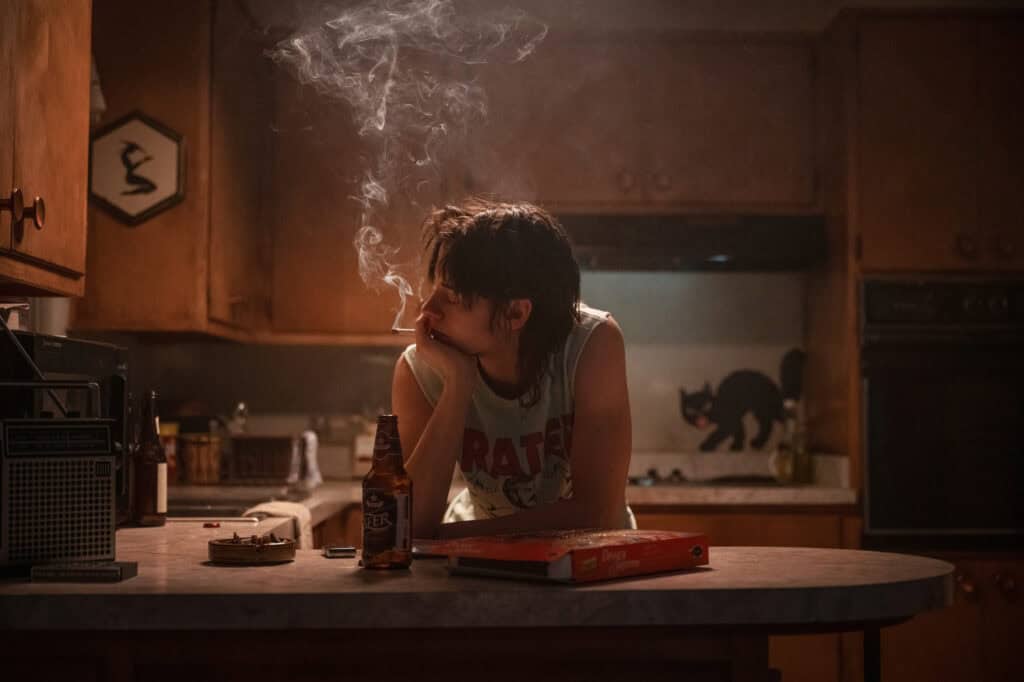
Credit: Anna Kooris.
So, as you can probably tell, Glass is interested in the dichotomy of power vs control, the intersection of sex and violence, and the spectrum of abuse men are capable of. But trying to get a fully coherent message or worldview out of Love Lies Bleeding, some kind of serious treatise, is the wrong way to look at the film. Its characters are much too messy, impulsive, and passionate for that. The sly comedic edge of Saint Maud, a jet-black streak which would manifest at irregular and unexpected intervals, has proliferated its presence to such a degree that the Coen Brothers invocation ends up being justified. Whilst never coming off as glib or insensitive to the effects of roid rage and spousal abuse, Glass’s screenplay (co-written with Baby Reindeer director Weroinka Tofilska) is “be gay, do crimes” manifest. Drunk off of love and lust, revelling in bad taste, pulsating with a desire for fun and the next high like a lost-80s B-movie, and that’s before reaching the Scarface-esque good times montage right as things prepare to go to shit.
Glass reteams with her cinematographer, Ben Fordesman, and editor, Mark Towns, from Saint Maud and all three work steamy magic here. Fordesman’s camera is enthralled by Jackie, the power her body can exert and the mental strength required to push it to such feats, just like Lou is and draws constant attention to the flirtatious dance the two leads engage in. Towns’s editing similarly cuts to a rhythmic heartbeat, pulsating in time with the mental states of Lou and Jackie, from flat boredom to the electrifying moment where somebody finally truly sees you to a spiralling vomit where you seem to disassociate from yourself. The film’s primary colour scheme of deep reds and blacks tease the sexual desire which bubbles under the surface of many a classic David Lynch work out into the open whilst adding a surreality that can be intoxicating even when hinting at both leads’ darker past.
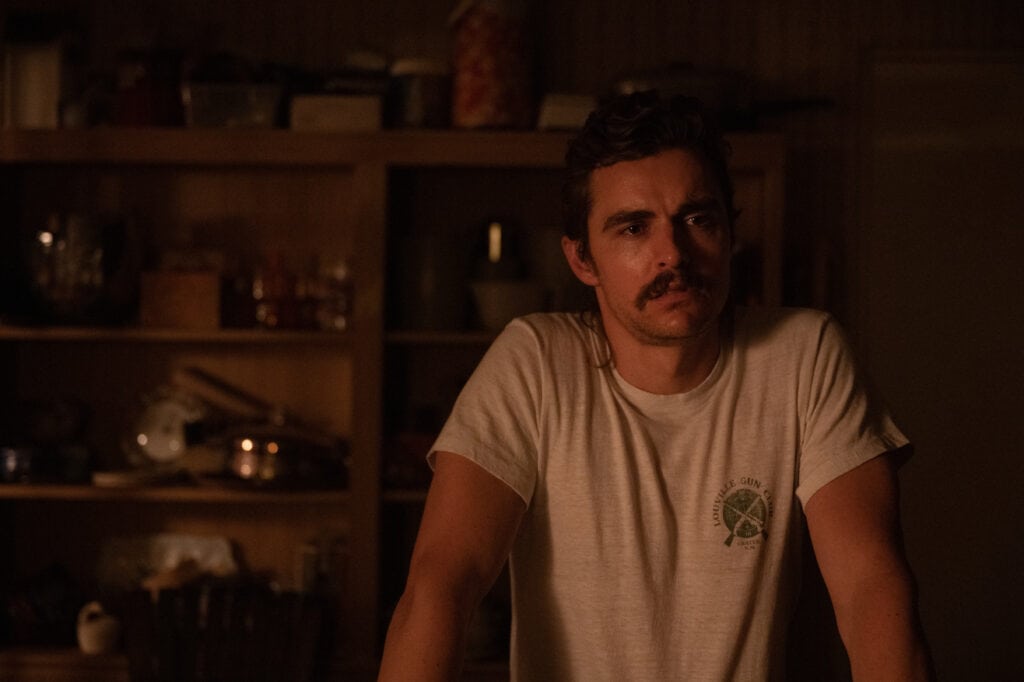
Credit: Anna Kooris.
For as unapologetically horny as Love Lies Bleeding is, it’s also an exceptionally tense thriller, especially as the walls start closing in on Lou and Jackie. Glass clearly gets an illicit thrill from fraying audience nerves and charging most every scene with the implicit or explicit threat of violence. (The special effects for the results of said violence got almost everyone in my press screening to audibly wince in discomfort.) The way in which JJ towers over Lou even when she’s threatening him over his abusing Beth, how Katy O’Brian shifts her performance when a potent mixture of intense emotions and rampant steroid abuse (which itself carries a transgressive sexual energy) overwhelms her, how the entire mood tangibly shifts whenever Lou Sr. enters a room. I initially wrote down in my notes, around the time that Lou is trying to keep a pair of cops from finding a dead body which is currently dripping blood into her cat’s mouth, that Glass’s handling of tension is reminiscent of Hitchcock, because that’s the cliché one always reaches for when in the midst of exemplar thriller direction.
But, in reality, her work here most reminds me of Lana and Lily Wachowski. There’s the pressure cooker crowd-working tension of Bound, knowing precisely how long to draw out a risky beat before letting it relax or snap. The freaky-deke queer sexuality of Sense8 and sweaty celebration of bodies desiring each other from The Matrix Reloaded’s Zion stretch. But, most of all, Glass shares the same go-for-broke earnestness of the Wachowski Sisters. A willingness to swing for the fences and go for the most romantic image possible regardless of whether more normie audiences think it’s “uncool” or “silly.” Love Lies Bleeding threatens a darkness throughout its runtime which could take a Saint Maud turn by the end, yet is instead subverted for the sort of gorgeously sincere and knowingly goofy metaphor that nonetheless feels entirely earned even as it will likely send part of the audience home laughing at it instead of with it. Unsurprisingly, given the tone of this review, I’m in the latter camp. All the tension and gleeful seediness of the prior 95 minutes releasing in this beautiful expression of the strength true love channelled properly can provide, particularly to queers struggling to find their place in the world.
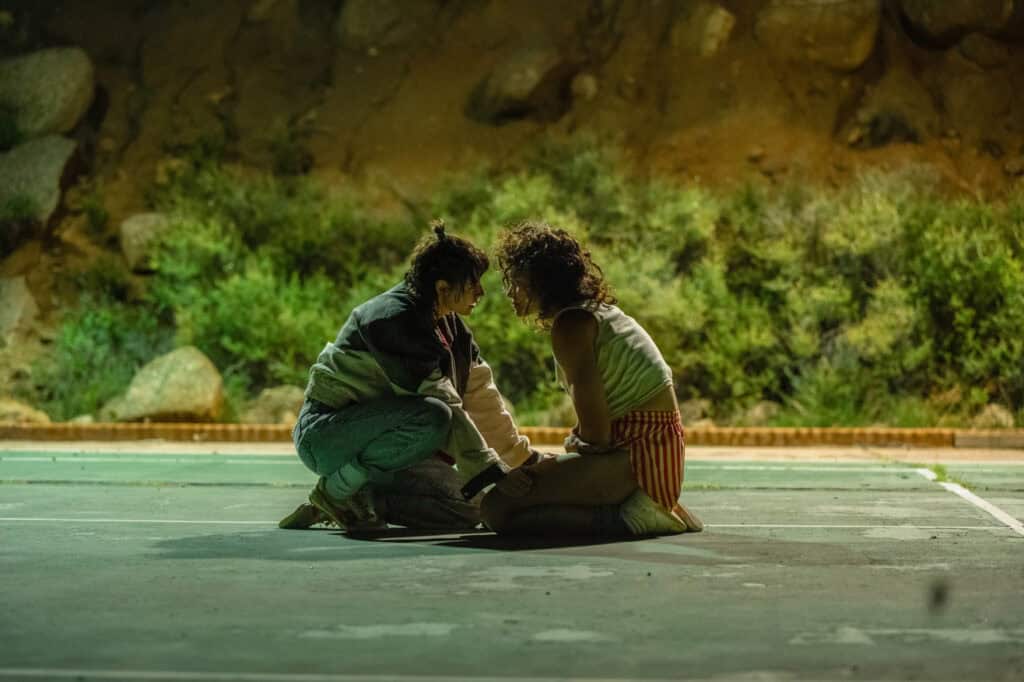
Credit: Anna Kooris.
Stewart and O’Brian are just as responsible for this swell as Glass. Stewart has rebuilt her rep over the last decade-plus of being a really bloody good character actress often stuck in material beneath her talents and this is her best performance since Certain Women. She’s great at embodying Lou’s introversion and buried capacity for violence, nails the often blackly-comic tone without ever overselling an expression, and of course has electric chemistry with O’Brian who, for her part, is a born Star. The instant Jackie appears on screen, O’Brian oozes presence and captivating energy, having an absolute whale of a time as this larger-than-life whirlwind of a woman. But she’s also got the dramatic chops to get to the heart of the insecurity powering Jackie, the unpredictable intimidation when her steroids make her fly off the handle, and the sweet softness as she and Lou get closer to one another.
And, in its own twisted way, this is ultimately a sweet love story made for the freaks and the queers. The kind of bracing, charged, hot, hypnotic romance-thriller cinema has been badly craving for years now, made by the kind of filmmaker who just instinctually gets what makes these things tick. Love Lies Bleeding is the sort of film that reminds me why I still love going to the cinema despite everything. The kind of film that makes me feel 100ft tall, running through the clouds high off the ecstasy of pure emotion. I didn’t get out of my seat for a good five minutes after the credits dance faded to black, I just wanted to sit in that pure joy and the romantic synth arpeggios of Martin Rev’s “Whisper” for a little longer. If I can still get that rapturous feeling from Rose Glass even when she’s lost the element of surprise that Saint Maud benefitted from, then the world is her oyster.

